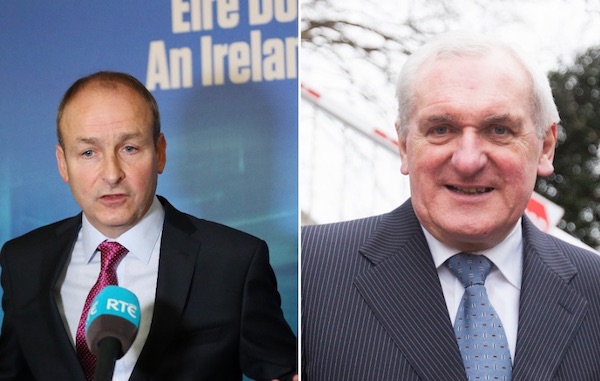
With a growing consensus around the need for a border poll to reunite Ireland in accordance with the Good Friday Agreement, right-wing politicians in the 26 Counties have been using the Christmas period to attempt to silence the calls and urge a return of the partitionist institutions at Stormont instead.
While the Scottish government is pressing ahead with plans for a referendum, Irish politicians and mainstream media pundits have begun wringing their hands and warning very loudly of the consequences of a serious debate on reunification.
Fianna Fáil leader Micheál Martin (left), said that while his party was “for a united Ireland”, he insisted he would not be making preparations for a border poll if elected Taoiseach.
“The poll itself should be the culmination of a developed understanding. I believe in an evolutionary pathway to this, rather than sudden,” he said.
“One of our biggest achievements is the Good Friday Agreement, and now parties are trying to push the Good Friday Agreement aside,” he added, apparently unaware that the 1998 peace deal specifies explicitly that such a poll can take place every seven years.
In a highly dismissive and apparently co-ordinated remark, former Fianna Fail Taoiseach Bertie Ahern (right), one of the negotiators of the Good Friday Agreement, said anyone who believes Irish unity will happen next year “should go for a trip in space for a decade”. He called for efforts to be directed instead at restoring Stormont.
“The institutions in Northern Ireland have to be operational, successfully, unhindered, for a prolonged period of time,” he declared.
Sinn Féin TD Pearse Doherty branded the remarks “utterly shameful” and said Fianna Fáil had become the “anti-republican” party.
“Whilst Fianna Fáil occasionally pays lip service to its Republican roots, it has long since gave up any notion of bringing the Republic proclaimed in 1916 to fruition,” he said.
“It has, under Micheál Martin’s leadership in particular, become the party of gombeen men that Mellows foretold would accept partition.”
Sinn Féin has called for a referendum on Irish unity in the north within five years. Mr Doherty said:
“There is nothing radical about any of this. It’s time the people had their say and it’s time we started planning for their verdict. A referendum on Irish unity is expressly provided for in the Good Friday Agreement; an agreement that was endorsed by the people of this island, north and south, overwhelmingly over 20 years ago.”
Sinn Féin’s leader in the Six Counties, Michelle O’Neill has however said she sees the return of Stormont “as an imperative” for the debate on reunification, without further explanation. Ms O’Neill has been involved in talks in Belfast between the DUP and Sinn Féin to try to reach a deal to restore the institutions ahead of a deadline set by British Direct Ruler Julian Smith for later this month.
Smith has also threatened to hold an Assembly election, which could be expected to result in a drop in representation for the DUP and a further tip of the balance in favour of nationalists.
The current Taoiseach, Leo Varadkar, has admitted the election of more nationalist than unionist MPs in last month’s Westminster poll was “not a one-off”.
The Westminster result was unprecedented and fuelled widespread hopes that the north of Ireland could still hope to escape Brexit through reunification with the South in tandem with an independent Scotland.
But Mr Varadkar claimed parties that supported a united Ireland did not have a majority, adding that was why he was opposed to holding a poll on Irish unity now.
Despite increasing support for reunification, Sinn Féin vote share has declined, with many republican voters staying away from the polls -- as in Scotland, the overall support for the nationalist parties is short of a majority.
It is “still well short of the 50% plus one that you would need to win a border poll,” said Mr Varadkar. “That is why I don’t think that a border poll is a good idea. I don’t see that we would gain from that sort of scenario.”
But he accepted recent elections had shown a change in political sentiment amongst the electorate.
“For the first time since the foundation of Northern Ireland, unionist parties do not have a majority. They definitely don’t, it was not a one-off, it is four elections now of different sorts.”
Nationalists and republicans broadly oppose the return of the partitionist institutions and see them as a hindrance to Irish unity, but Varadkar insisted they should return.
“We have to learn from our history and we have to understand that there are a million people on this island who are British and are unionists so we need to respect that and make sure that they are part of the future and they feel part of the future.”
Asked his opinion about the matter this week, Irish actor Stephen Rea has said the unification of Ireland is “inevitable” and that conversations about its constitutional future should and will continue.
“There are things that are happening that are outside the control of politicians. There is a movement of people and the imagination of people,” said the actor, one of those behind a petition calling for a Citizens’ Assembly on Irish unity.
“My view is to stay calm. There is nothing logical about a partitioned island. There is nothing that works about it. Let’s just quietly move on to unity”.
![[Irish Republican News]](https://republican-news.org/graphics/title_gifs/rn.gif)
![[Irish Republican News]](https://republican-news.org/graphics/title_gifs/harp.gif)

